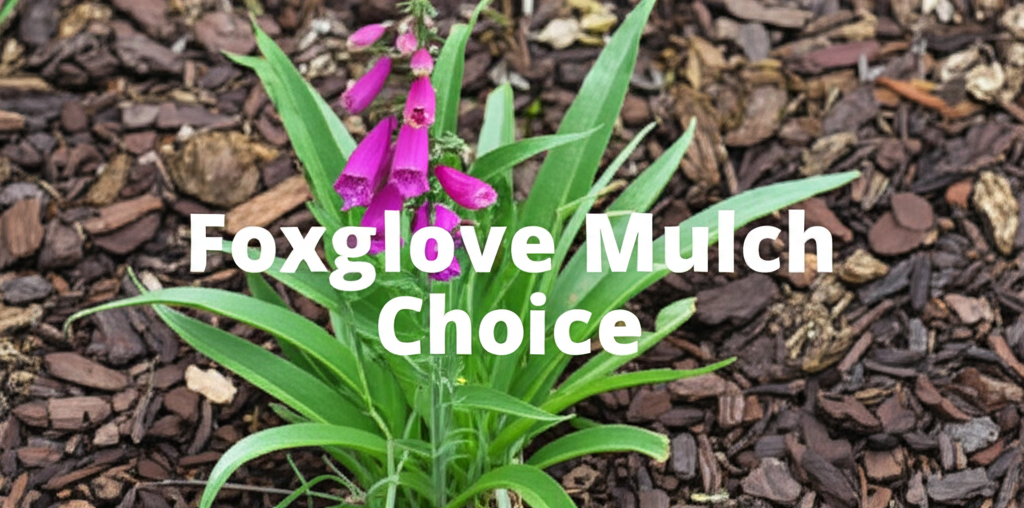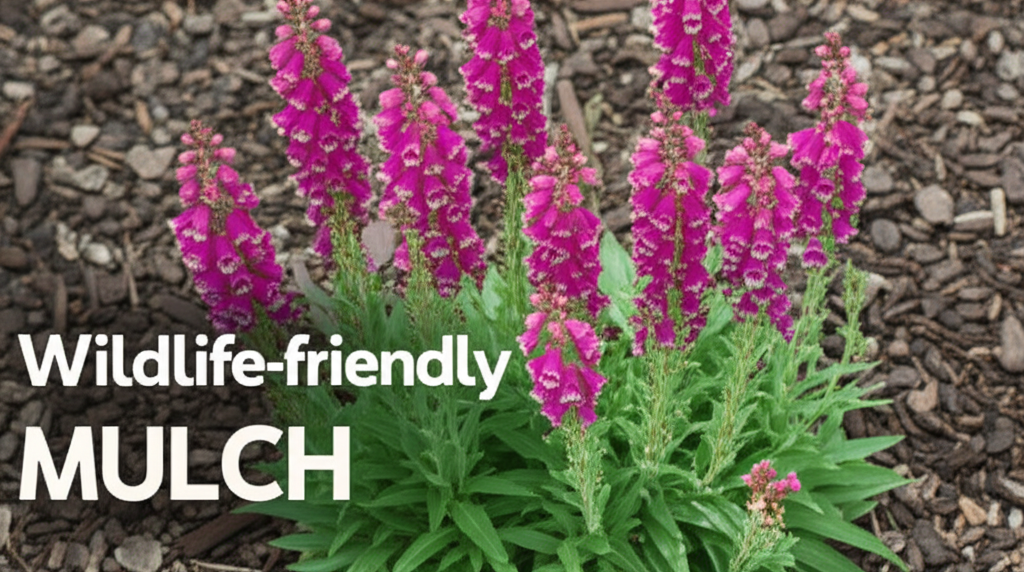The Allure of Foxglove Beardtongue and the Importance of Mulch
Foxglove Beardtongue, scientifically known as Penstemon digitalis, is a captivating native perennial that brings a touch of wild elegance to any garden. Its tall, elegant spikes adorned with tubular, often white or pale lavender flowers are a beacon for pollinators, particularly bees and butterflies. Beyond its aesthetic appeal, Foxglove Beardtongue is a hardy and adaptable plant, thriving in a variety of conditions. However, to truly unlock its potential and foster a healthy, vibrant ecosystem in your garden, understanding the role of mulch and making informed selection choices is paramount. Mulch, often overlooked, is a fundamental component of successful gardening, offering a myriad of benefits that directly impact plant health and the surrounding wildlife.
Understanding the Multifaceted Benefits of Mulch

Mulch is more than just a decorative ground cover; it’s a vital gardening tool. Its applications extend from improving soil health to creating a more hospitable environment for beneficial insects and other garden visitors. Properly chosen and applied mulch acts as a protective blanket for the soil, offering a range of advantages:
- Moisture Retention: Mulch significantly reduces water evaporation from the soil surface, meaning less frequent watering is required. This is especially beneficial during dry spells and for plants like Foxglove Beardtongue, which prefer consistently moist, but not waterlogged, soil.
- Temperature Regulation: It insulates the soil, keeping it cooler in the summer months and warmer in the winter. This consistent temperature helps prevent root damage caused by extreme temperature fluctuations.
- Weed Suppression: A layer of mulch effectively blocks sunlight from reaching weed seeds, significantly inhibiting their germination and growth. This reduces the need for chemical herbicides and manual weeding.
- Soil Improvement: Organic mulches, as they decompose, add valuable nutrients and organic matter to the soil, improving its structure, aeration, and fertility over time.
- Erosion Control: Mulch helps to bind the soil particles together, preventing erosion caused by wind and rain, particularly on slopes.
- Habitat Creation: For wildlife, mulch can provide crucial habitat, offering shelter, nesting material, and overwintering sites for beneficial insects like ground beetles and solitary bees.
Key Considerations for Wildlife-Friendly Mulch Selection for Foxglove Beardtongue
When selecting mulch for your Foxglove Beardtongue, the primary goal is to support its growth while simultaneously creating a beneficial environment for the diverse array of wildlife that will visit your garden. This means prioritizing organic, natural materials that break down over time and offer ecological benefits.
Organic Mulches: The Natural Choice
Organic mulches are derived from plant matter and, as they decompose, they enrich the soil. This makes them an ideal choice for a wildlife-friendly garden. For Foxglove Beardtongue, which prefers well-draining soil with good organic content, these are the top contenders:
- Compost: Well-rotted compost is a gardener’s best friend. It’s rich in nutrients, improves soil structure, and provides a food source for earthworms and beneficial microbes. It’s gentle enough not to smother young plants and readily breaks down.
- Shredded Bark: Particularly pine or cedar bark, this mulch is aesthetically pleasing and long-lasting. It decomposes slowly, providing a sustained release of nutrients. Its texture can also offer good habitat for ground-dwelling insects. Ensure it’s aged and not freshly cut, which can tie up nitrogen.
- Wood Chips: Similar to shredded bark, wood chips offer excellent moisture retention and weed suppression. Larger chips break down more slowly, providing longer-lasting coverage. Smaller chips decompose faster, contributing to soil fertility more quickly.
- Leaf Mold: Decayed leaves are a superb soil conditioner and a gentle, nutrient-rich mulch. They decompose relatively quickly, adding valuable organic matter. Collecting fallen leaves in autumn is an excellent way to create this free resource.
- Straw: Particularly straw (not hay, which contains seeds), it’s an excellent insulator and moisture retainer. It breaks down relatively quickly and is a good option for suppressing weeds. However, it can sometimes harbor slugs, so monitor accordingly.
Inorganic Mulches: A Cautious Approach
While inorganic mulches like gravel or stone can be aesthetically pleasing and offer weed suppression, they generally offer fewer ecological benefits for wildlife and can sometimes hinder soil health.
- Gravel/Stone: These materials do not decompose and therefore do not add organic matter to the soil. They can also absorb and radiate heat, potentially stressing plant roots in hot climates. They offer minimal habitat for beneficial insects compared to organic options.
Key Facts and Comparison of Mulch Types for Foxglove Beardtongue
To help you make the most informed decision, here’s a comparison of common mulch types, focusing on their suitability for Foxglove Beardtongue and their benefits for wildlife:
| Mulch Type | Soil Improvement | Moisture Retention | Weed Suppression | Wildlife Habitat | Decomposition Rate | Aesthetic Appeal | Suitability for Foxglove Beardtongue |
|---|---|---|---|---|---|---|---|
| Compost | High | Good | Good | Excellent (soil microbes, earthworms) | Fast | Natural, rich brown | Excellent |
| Shredded Bark (Pine/Cedar) | Moderate | Very Good | Very Good | Good (ground insects) | Slow | Natural, varied textures | Very Good |
| Wood Chips | Moderate | Very Good | Very Good | Good (ground insects) | Moderate | Natural, woodsy | Very Good |
| Leaf Mold | Excellent | Good | Good | Excellent (soil microbes, insects) | Moderate | Natural, earthy | Excellent |
| Straw | Moderate | Very Good | Good | Good (ground insects, potential slug habitat) | Moderate to Fast | Natural, light brown | Good |
| Gravel/Stone | None | Poor | Excellent | Poor | None | Varied (artificial, can look natural) | Fair (can overheat soil) |
Application and Maintenance: Best Practices for Mulching
Proper application and ongoing maintenance are crucial to maximizing the benefits of your chosen mulch and ensuring the health of your Foxglove Beardtongue and garden inhabitants.
Steps for Applying Mulch
- Prepare the Area: Begin by clearing the area around your Foxglove Beardtongue plants. Remove any existing weeds and debris. Gently loosen the top layer of soil if it has become compacted.
- Water the Soil: Water the soil thoroughly before applying mulch. This helps to ensure that moisture is captured and retained by the mulch from the outset.
- Apply the Mulch: Spread a layer of your chosen organic mulch evenly around the base of the plants. Aim for a depth of 2-3 inches.
- Maintain a Mulch-Free Zone: Crucially, keep the mulch a few inches away from the actual stems of the Foxglove Beardtongue plants. This prevents moisture buildup against the stems, which can lead to rot and disease, and also discourages pests from overwintering in direct contact with the plant base.
- Replenish as Needed: Organic mulches will decompose over time. Check the mulch depth annually and replenish as necessary to maintain the 2-3 inch layer.
Pros and Cons of Different Mulch Strategies
Understanding the trade-offs of various mulching approaches can help you tailor your strategy.
| Mulch Strategy/Type | Pros | Cons |
|---|---|---|
| Thick Layer of Organic Mulch (e.g., Bark) | Excellent weed suppression, superior moisture retention, long-lasting, good habitat for ground insects. | Can be too insulating in very hot climates, may harbor slugs if too damp, can suppress very small seedlings if applied too early. |
| Thin Layer of Compost | Rapid soil enrichment, feeds beneficial soil organisms, gentle on young plants, readily available nutrients. | Needs frequent replenishment, less effective at weed suppression and moisture retention compared to thicker layers. |
| Mixed Organic Mulches (e.g., Bark and Compost) | Combines benefits: structure and longevity from bark, rapid nutrient release and soil health from compost. | Requires sourcing multiple materials, can be more labor-intensive to apply. |
| Leaving Some Bare Soil Patches | Provides direct basking spots for some insects, allows some ground-nesting bees access to soil. | Increased weed growth, potential for faster soil drying, less aesthetic. |
| Inorganic Mulch (e.g., Gravel) | Excellent weed suppression, doesn’t decompose, can create a clean look. | No soil enrichment, can overheat soil, poor wildlife habitat, can impede water infiltration. |
Supporting Wildlife Beyond the Mulch Layer
While mulch plays a vital role, a truly wildlife-friendly garden encompasses a broader approach. By selecting the right mulch, you’re already on the right path, but consider these additional elements to create a thriving habitat:
- Plant Diversity: Beyond Foxglove Beardtongue, incorporate a variety of native plants that bloom at different times of the year, providing a continuous food source for pollinators and other beneficial insects.
- Water Source: A shallow bird bath or a small pond can be a lifesaver for birds, bees, and other garden creatures, especially during dry periods.
- Shelter and Nesting Sites: Leave some leaf litter in designated areas, provide bug hotels, or allow some areas of your garden to grow a little wild to offer crucial shelter and nesting opportunities.
- Avoid Pesticides: Chemical pesticides are detrimental to all wildlife, including beneficial insects. Opt for organic pest control methods or tolerate minor pest damage as part of a healthy ecosystem.
Conclusion: Nurturing a Harmonious Garden Ecosystem
Selecting the right mulch for your Foxglove Beardtongue is a powerful act of ecological stewardship. By choosing organic, natural materials like compost, shredded bark, or leaf mold, you not only foster the robust growth of this stunning native perennial but also cultivate a rich and inviting habitat for a diverse range of wildlife. The subtle benefits of mulch – from conserving moisture and regulating soil temperature to suppressing weeds and enriching the soil – all contribute to a more resilient and self-sustaining garden. As you nurture your Foxglove Beardtongue, remember that the choices you make regarding mulch are an integral part of creating a vibrant, interconnected ecosystem right in your own backyard.


